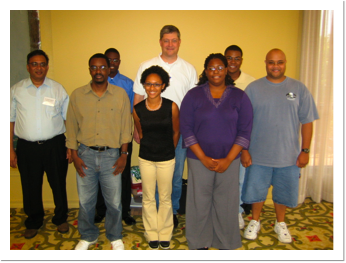



Held in the scenic town of Lake of the Ozarks, Missouri, the purposes of the CReSIS All-Hands Retreat were to both decide which experiments were going to take place in the field, and secondly to allow the faculty and staff of CReSIS to meet.
The fieldwork consists of Polar Study Seasons in both Greenland, and Antarctica. The Greenland study will take place in either May or June of 2008 before the ice begins to thaw. During this time the seismic studies of the ice sheets will be taken to assist in learning of the structure of the ice sheets. This research along with core samples will allow 3-D models to be designed that will be used to track ice sheet movement, and melting. Two portable GRID computer systems will be field tested during this time to process raw data. This data will then be used to help decide the next day’s selection of study area. The Antarctic study will take place in November or December of 2008. During the Antarctic study the debut of an 1100 pound unmanned aerial vehicle (UAV) will highlight the study session. This UAV will primarily be utilized to study glaciers, which are not safe for on-the-ground human study. The then perfected portable GRID will process the data directly from the UAV storage devices to select the next study area.
The secondary purpose of the retreat was communication. Scientist, and technologist often have a disconnect to the big picture of how a project that is being worked on, relates to others. The retreat allowed those multiple subsections of CReSIS to meet, and to establish dialogues. Sensor staff met with robotics staff. GRID specialist met with data processing staff. Radar specialist met with power staff. Due to the realized need for a centralized repository of information about the different persons who work on the CReSIS project, a decision for an on-line profile for every member was added as a goal for the technology group. Along with student mapping these additions by far will add to the success of the research project by opening those doors of communication across areas of specialization.


Saturday, August 11, 2007














